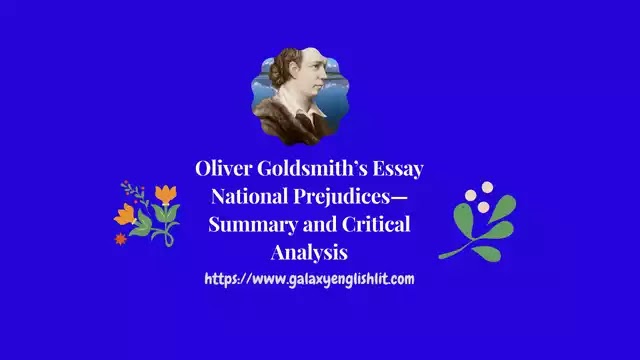Introduction:
Goldsmith is perfect in the art of character creation. He has introduced many imaginary characters. The man in black is a mysterious character created by Goldsmith. Although he is nameless, yet he can be easily identified by the black suit which he always wears. The man in black is a man of various inconsistencies. On one side he condemns the beggars and calls them vagabonds and hypocrites and also claims that he is able to identify whether the beggar is real or impostor, but on the other side he is easily swayed by the false stories and pretenses of the beggars. He tells the essayist that these beggars should be imprisoned and that they are the burden on the hard - working people, but he himself could not resist helping them.
 |
| Essay The Man in Black—Character Sketch of the Man in Black |
A Man of Strange Nature:
The man in black is a man of strange nature. In spite of being the master of some natural and noble qualities, he tries to suppress them and does not want to reveal them publicly. He is the only man who feels ashamed to have noble qualities. There are people, who boast of their qualities, but the man in black hides his real feelings and thoughts. He has a wonderful goodness of heart but he conceals it under a rough and forbidding exterior. The essayist observes:
“His manners, it is true, are tinctured with some strange inconsistencies; and he may be justly termed a humorist in the nation of humorists.”
His Sense of Superiority:
The man in black regards himself an embodiment of wonderful wisdom. He thinks that he has a great sense of practical wisdom. He claims that on the basis of his close observation he can detect whether the beggar is real or not. His wisdom is exposed within no time. He cannot judge the old man who is a hypocrite and his stories about his dying wife and hungry children are false. The man in black is easily befooled by the old man. The sailor too deceives him by speaking in angry tone. When a woman in rags with two babies who was a real beggar, comes before him, he has nothing to offer her because he has already given his money to the impostors. At this place he feels himself great helpless because the woman really deserves his help.
Generous, Kind and Sympathetic:
The man in black is endowed with the feelings of pity, sympathy and tenderness. He is intensely humane and tender. He is naturally sympathetic for the poor, jobless and needy people. He cannot bear anybody suffering. He, therefore, helps the old man and the sailor, in spite of criticising them. He tells the essayist that he would show him how he can easily detect an impostor and begins to examine the sailor assuming a look of importance. But when he hears the false story of the sailor, he is at once softened and is prepared to help him by buying his bundles of matches. He pays him a shilling which is more than the real cost of the matches. His great humanity is exposed when he fails to help the beggar woman. When he fails to find any shilling in his pockets, he becomes more miserable than the woman herself. His pain and tension can be seen clearly over his face. But finally he relieves himself by offering her the bundles of matches which he had bought from the sailor.
A Man of Hard Tongue but Soft Heart:
The man in black's conversation is replete with the most sordid and selfish maxims, but his heart is dilated with the most unbounded love. He professes himself a man hater, while his cheeks glow with compassion. He uses the language of the most unbounded ill - nature, while his looks are softened into pity. He affects to be merciless and argues against beggars. He expresses his surprise how any of his countrymen can be so foolishly weak as to relieve occasional objects of charity, when the laws have made such ample provision for the support of the poor. In every parish house, they are supplied with food, clothes, fire and a bed to lie on, so they should feel contented. Still they seem discontented and trouble the passengers and rob them by telling false stories of their poverty. He condemns the legal system for not taking action against the hypocrite beggars. He advises to put them in the prisons. He calls them great burden on industrious men.





